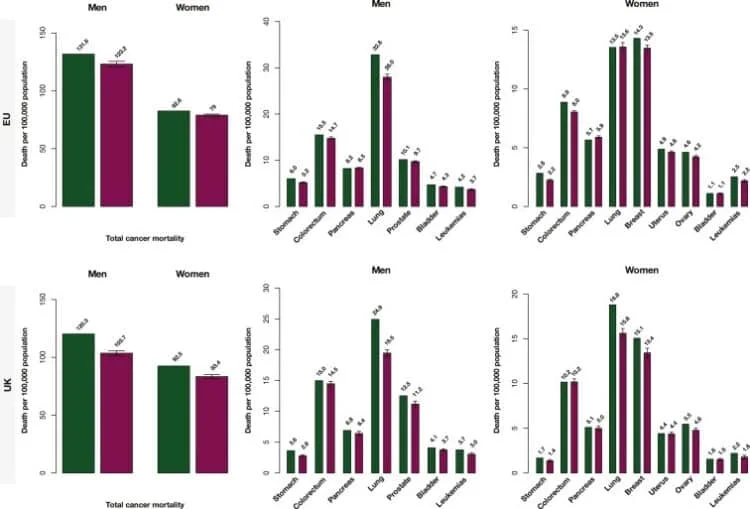Scientists discovered why colon cancer “gets younger”
- January 29, 2024
- 0
Experts from the University of Milan predict that the death rate from bowel cancer in the UK in 2024 will increase by 26% in men and 39% in
Experts from the University of Milan predict that the death rate from bowel cancer in the UK in 2024 will increase by 26% in men and 39% in

Experts from the University of Milan predict that the death rate from bowel cancer in the UK in 2024 will increase by 26% in men and 39% in women aged 25-49 compared to 2018. This will be the largest increase on the continent, so there is a clear explanation for this.
Colorectal cancer is the third most common cancer in the world, accounting for approximately 10% of all cancer cases and the second leading cause of cancer death. A malignant tumor is localized in the epithelium of the sigmoid (large) intestine and rectum, quickly affecting the surrounding tissues with metastases. This disease mainly strikes the elderly, with most cases generally falling on people over 50 years of age. The average age of colorectal cancer patients in Russia is around 60-64 years.
However, in a new study published in the journal Annals of OncologyScientists have shown that the prevalence of this type of cancer begins to increase significantly among men and women aged 25 to 49 years.
In particular, the case rate in Italy is expected to increase compared to 2018: 1.5% in men and 2.6% in women. In Spain, 5.5% and 7.2% respectively. The sharpest increase is expected to be in Great Britain, with 26% for men and 39% for women. Experts from the University of Milan explained what causes these frightening indicators.
Firstly, if a person eats an insufficient amount of fruits and vegetables, but insists on products containing trans fats and other components of uncertain usefulness, eats a lot of animal fats, fast food that are difficult to dissolve, then this leads to obesity. systematic constipation and malfunctions of the glands of the digestive system. Such food remains in the intestine for a long time, and as a result, with prolonged contact with the mucosa, mutation processes begin and lead to the development of neoplasms.
Secondly, a sedentary lifestyle, which is now very common, also contributes to the development of colorectal cancer. Mobility decreases, thus intestinal functions are inhibited. It also puts you at risk for overweight, obesity, and related health problems such as high blood sugar and resulting diabetes.
Third, alcohol and smoking increase the risk of fatal diseases. According to researchers, it is possible to get out of the risk zone: It is enough to give up bad habits, eat a balanced diet and lead a physically active lifestyle. You should also undergo regular medical checkups.

However, due to global changes in the characteristics of most workplaces (remote working, widespread transition to digitalization requiring long periods of sitting) and the food crisis (rising prices/inflation, decreasing quality of food raw materials, popularity of cheap and harmful substitutes for food), natural products are increasing in demand for fast food. It is difficult to follow these recommendations. Hence such sad predictions.
But according to Italian scientists, the death rate from the rest of cancer in Great Britain should fall from 120.3 per 100,000 people to 103.7 per 100,000 people. Over the same period (2018 to 2024), lung cancer cases will decrease by an average of 15% and breast cancer death rates will also decrease by 11% (from 15 to 13 per 100,000 women). Finally, in the UK, pancreatic cancer will become 7% less common in men and 2% less common in women.
Source: Port Altele
As an experienced journalist and author, Mary has been reporting on the latest news and trends for over 5 years. With a passion for uncovering the stories behind the headlines, Mary has earned a reputation as a trusted voice in the world of journalism. Her writing style is insightful, engaging and thought-provoking, as she takes a deep dive into the most pressing issues of our time.